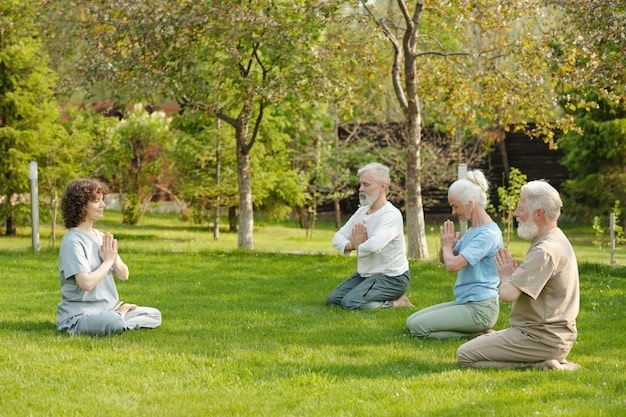Zen and Aging: Finding Peace and Acceptance in Later Life

Zen and the Aging Process: Finding Grace and Acceptance in Later Life explores how Zen principles can provide solace, wisdom, and practical guidance for navigating the challenges and embracing the opportunities that come with growing older.
As we journey through life, the aging process brings inevitable changes, challenges, and opportunities for reflection. Zen and the Aging Process: Finding Grace and Acceptance in Later Life offers a pathway to navigate these changes with mindfulness, acceptance, and a renewed sense of purpose.
Understanding Zen Principles for Aging
Zen, a school of Mahayana Buddhism, emphasizes direct experience and mindfulness as pathways to enlightenment. Applying Zen principles to the aging process can foster a sense of equanimity and acceptance.
Zen teaches us to live in the present moment, appreciate the impermanence of life, and cultivate inner peace. These principles offer profound comfort and guidance as we navigate the physical, emotional, and spiritual changes that come with age.
The Core Zen Concepts
At the heart of Zen practice lies a commitment to mindfulness, meditation, and self-awareness. These practices can be transformative during the aging process, helping us to embrace change and find contentment.
- Mindfulness: Paying attention to the present moment without judgment, allowing us to fully experience life as it unfolds.
- Meditation: Cultivating a calm and focused mind through practices like zazen (seated meditation), fostering inner peace.
- Acceptance: Embracing the reality of change and impermanence, reducing resistance and fostering resilience.
By integrating these core Zen concepts into our lives, we can approach aging with greater ease and grace, finding joy and meaning in each moment.
In conclusion, understanding and applying Zen principles offers a powerful framework for navigating the aging process with greater mindfulness, acceptance, and inner peace. It allows us to appreciate the present while embracing the changes that come with age.
Mindfulness and the Present Moment
One of the greatest gifts of Zen is its emphasis on the present moment. As we age, focusing on the “now” can help us overcome anxieties about the future and regrets about the past.
Mindfulness involves paying attention to our thoughts, feelings, and sensations without judgment. This practice allows us to fully experience the richness of life, regardless of our age or physical limitations.

Practicing Mindfulness in Daily Life
Mindfulness doesn’t require hours of silent meditation. It can be integrated into our daily routines, transforming ordinary tasks into opportunities for mindful awareness.
- Eating Mindfully: Savor each bite, paying attention to the flavors, textures, and aromas of the food.
- Walking Mindfully: Notice the sensations of your feet on the ground, the movement of your body, and the sights and sounds around you.
- Listening Mindfully: Give your full attention to the person speaking, without interrupting or planning your response.
By practicing mindfulness in these simple ways, we can cultivate a deeper appreciation for life and find joy in the present moment.
In summary, embracing mindfulness and focusing on the present moment can greatly enhance our experience of aging, reducing anxiety and fostering a sense of gratitude for each day.
Accepting Impermanence and Change
Zen Buddhism teaches us to embrace the impermanence of all things. As we age, this understanding becomes particularly relevant, as we experience physical and emotional changes.
Accepting impermanence doesn’t mean passively resigning ourselves to decline. Rather, it means acknowledging the reality of change and finding ways to adapt and thrive despite it.
Finding Peace in Impermanence
By acknowledging the transient nature of life, we can let go of our resistance to change and find a deeper sense of peace. This acceptance allows us to appreciate the beauty of each moment, knowing that it will not last forever.
- Reflect on Past Changes: Consider how you have adapted to changes in the past, recognizing your resilience and strength.
- Practice Non-Attachment: Let go of your attachment to material possessions, physical appearance, and fixed ideas about yourself.
- Embrace the Present: Focus on what you can control in the present moment, rather than dwelling on past losses or future uncertainties.
Embracing impermanence empowers us to live more fully and authentically, finding joy in the ever-changing landscape of life.
In conclusion, accepting impermanence and change is a crucial aspect of aging gracefully, allowing us to approach the inevitable transitions of life with openness, flexibility, and inner peace. This acceptance becomes a source of strength and resilience as we navigate the aging process.
Cultivating Compassion and Connection
Zen practice encourages us to cultivate compassion for ourselves and others. As we age, nurturing meaningful connections and extending kindness to those around us can enrich our lives and foster a sense of belonging.
Compassion involves recognizing the suffering of others and responding with empathy and a desire to alleviate their pain. This practice not only benefits those around us but also strengthens our own sense of well-being.
The Power of Connection
Maintaining social connections is essential for healthy aging. Meaningful relationships provide emotional support, reduce feelings of isolation, and offer opportunities for growth and connection.
- Volunteer Your Time: Giving back to your community can provide a sense of purpose and connection, while also helping others.
- Stay in Touch: Make an effort to connect with friends and family regularly, whether in person, by phone, or online.
- Join a Group: Participate in activities that resonate with your interests, such as book clubs, hiking groups, or meditation circles.
By actively cultivating compassion and connection, we can build a supportive network that enhances our well-being and enriches our lives as we age.
To conclude, cultivating compassion and connection is vital for a fulfilling aging experience, providing support, purpose, and a sense of belonging. Nurturing relationships and extending kindness not only benefits others but also enriches our own lives.
Mindful Movement and Physical Well-being
Zen principles extend to our physical well-being. Incorporating mindful movement practices like yoga, tai chi, or even gentle stretching can help us maintain physical health and cultivate a deeper connection with our bodies as we age.
Mindful movement involves paying attention to the sensations in our bodies as we move, breathing deeply, and approaching exercise with a sense of curiosity and non-judgment.

Finding Your Movement Practice
The key to mindful movement is finding an activity that you enjoy and that suits your physical abilities. Whether it’s a gentle walk in nature or a structured yoga class, the benefits are profound.
- Listen to Your Body: Pay attention to any pain or discomfort, and adjust your movements accordingly.
- Focus on Your Breath: Coordinate your breath with your movements, inhaling as you expand and exhaling as you contract.
- Accept Your Limitations: Acknowledge any physical limitations and focus on what you can do, rather than what you can’t.
By incorporating mindful movement into our lives, we can enhance our physical well-being, reduce stress, and cultivate a deeper sense of connection with our bodies.
In summary, mindful movement practices are essential for maintaining physical health and fostering a deeper connection with our bodies as we age. Engaging in enjoyable activities that suit our abilities enhances well-being and reduces stress.
Finding Meaning and Purpose in Later Life
As we transition into later life, it’s natural to reflect on our purpose and legacy. Zen principles can guide us in finding new sources of meaning and fulfillment, whether through creative expression, spiritual exploration, or simply being present for our loved ones.
Finding meaning involves identifying our values, passions, and strengths, and using them to contribute to something larger than ourselves. This sense of purpose can bring joy, motivation, and a renewed sense of identity.
Embracing New Beginnings
Aging is not an end, but rather a new beginning. It’s an opportunity to explore new interests, develop new skills, and redefine what brings us joy and fulfillment.
- Pursue Your Passions: Dedicate time to activities that you love, whether it’s painting, writing, gardening, or playing music.
- Learn Something New: Take a class, read a book, or explore a new hobby that sparks your curiosity and expands your horizons.
- Share Your Wisdom: Mentor younger generations, volunteer your time, or simply share your life experiences with others.
By embracing new beginnings and finding meaning in later life, we can continue to grow, learn, and contribute to the world around us, regardless of our age.
In conclusion, finding meaning and purpose is crucial for a fulfilling life, especially as we age. Zen principles guide us in discovering new sources of joy, motivation, and contribution, ensuring continued growth and engagement with the world.
| Key Point | Brief Description |
|---|---|
| 🧘 Mindfulness | Focus on the present moment without judgment. |
| 🔄 Accepting Change | Embrace the reality of impermanence and adapt to new circumstances. |
| ❤️ Compassion | Cultivate kindness for yourself and others, fostering connection. |
| 🌱 Finding Purpose | Discover new sources of meaning and fulfillment in later life. |
Frequently Asked Questions
▼
Zen is a school of Buddhism that emphasizes mindfulness and living in the present. It helps with aging by promoting acceptance of change, reducing stress, and encouraging a focus on inner peace.
▼
Mindfulness practices can help manage pain, reduce anxiety about the future, and increase appreciation for the present moment. They also foster a sense of calm and well-being.
▼
Simple ways include practicing mindful breathing, eating slowly and savoring each bite, and focusing on the sensations of your body during everyday activities like walking or washing dishes.
▼
Zen teaches that everything is constantly changing. By understanding this, we can release resistance to change, accept the natural flow of life, and find peace in impermanence.
▼
Compassion, both for oneself and others, is central to Zen. It promotes connection, reduces feelings of isolation, and fosters a sense of purpose and well-being in later life.
Conclusion
Incorporating Zen principles into the aging process can lead to a more peaceful, accepting, and fulfilling later life. By focusing on mindfulness, embracing change, cultivating compassion, and finding new sources of meaning, we can navigate the challenges of aging with grace and equanimity.





